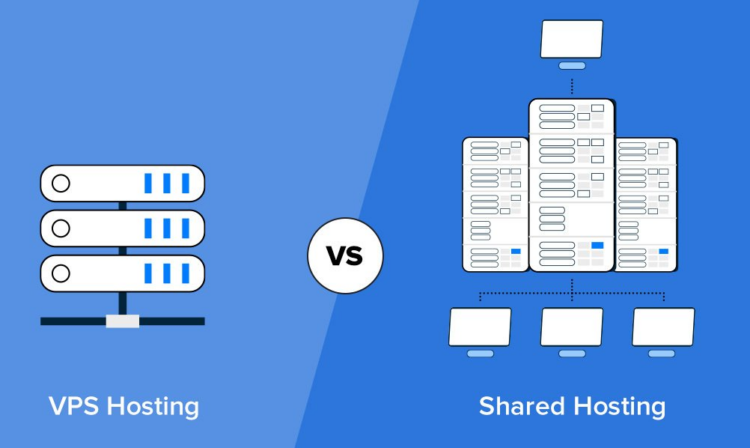Hosting, in general, can be quite complicated and stressful. Choosing the right server with the right bandwidth and operational capacity and a prime location can be a nightmare if you’re not tech savvy. However, migrating your data from an already established hosted server is even more stressful and complex.
Naturally, there needs to be a set of key advantages and pros to migrating from certain hosting methods, such as shared hosting, to more advanced methods, such as VPS hosting. In this article, we are going to go over these advantages, define what VPS hosting is, and see if VPS hosting is right for you.
Page Contents
What is VPS Hosting?
Virtual Private Server, or VPS for short, is a type of virtual machine (VM) that uses the allocated resources to it in order to create a private server which then can be used for a variety of purposes such as remote access, etc. Using VPS as a server to host information, data and potentially content and websites, is known as VPS hosting. Using VPS as a host is relatively newer compared to shared hosting, which uses the more traditional pattern of employing on-campus hardware as opposed to allocating hardware to VMs. But how exactly does VPS hosting fare against shared hosting?

img source: bluehost.in
Technically speaking, VPS hosting blows shared hosting out of the water across almost all performance-based categories. It is a faster, more efficient hosting method since you will not be sharing the dedicated resources with any other users, and there will be no sudden shortages of resources. You will also have root access to the server, allowing you to install new software and apps and modify the server as much as possible. You also get your own dedicated IP address which will not be shared by any other user. This will give you an additional level of security and will prevent your IP address from being jeopardized due to the actions of other users.
Last but not least, VPS hosting is inherently much more scalable. You can add or reduce dedicated resources depending on your needs. The only downsides here are the fact that VPS hosting requires more technical knowledge to operate. It also costs more than shared hosting.
In order to determine whether shared hosting can be efficient and useful for your needs, you need to look at what you are going to be doing with the host. If your tasks on the host involve everyday tasks that are not demanding on the bandwidth and software, then by all means, do go for a shared hosting server. Another major attraction of shared hosting is the fact that it is incredibly cheap. You can find shared hosting services as cheap as $3 per month. So if you’re looking for an economical option, shared hosting is something to consider.
Who Should Use VPS Hosting?

img source: mcloud.rs
VPS hosting stands on the other side of the spectrum when it comes to hosting. So you can pretty much apply the opposite of the logic we applied in the previous section to see which use cases fit VPS hosting the best. If your tasks require a lot of traffic and are a burden on hardware, then you pretty much have no other option than to go for VPS hosting. You will also need VPS hosting if the nature of hosted data is sensitive and requires additional security.
1. Dedicated Resources
With VPS hosting, you get access to your own private set of dedicated hardware and software resources that will not be shared with any other user and will be exclusive to you. This will prevent resource fluctuation and give you much-needed stability in performance. So if your task demands these resources, go for VPS hosting.
2. Full Root Access
While with shared hosting, you will be confined to whatever setup the server admin has decided for you and other users, with VPS hosting, you will have root or admin access to customize and adjust the server to your own needs via installing new programs and other liberties that you would not get on shared hosting.
3. Security
As previously mentioned, the security difference between shared hosting and VPS hosting is night and day. With VPS hosting, you will get your own IP address which will prevent you from being exposed to other users’ actions. You are also able to enhance your security with whatever adjustment you see fit, such as installing anti-viruses.
Expert Recommendations on Best VPS Providers

img source: visualmodo.com
So you have decided to give VPS hosting a shot. But apart from general advice that you would find on the internet, you are not sure which option is the best. No worries, as I will quickly give out some expert tips. Always go for a VPS service that is in close proximity to you, even if they offer multiple locations. Another major aspect of VPS quality is the amount of scalability they offer and the manner in which they offer it. Go for a provider that has a high scalability ceiling that also allows you to scale up or down instantly.
Four Things to Consider Before Choosing a VPS Service

img source: skyhosting.rs
1. Connection Quality
This is really important. Try to evaluate the latency of the VPS provider’s server before you make a purchase from them. The connection quality and overall latency are especially important if you want to host a website or use your VM to trade in markets such as forex.
2. Tech Support
Make sure that the VPS provider has 24/7 and efficient tech support, as managing a VPS server can indeed get rather difficult as you try to do different things with it.
3. Pricing
A lot of well-known VPS providers with reputable names boost the prices without actually offering much for the extra money they charge. So always consider the full price range, and look for the best deal somewhere in the middle. More expensive doesn’t mean better!
4. Uptime
Last but not least, we have an uptime rate. Especially since hosting websites and other data require a good uptime rate, look for uptime of 99% and higher from your VPS provider.
Summary
VPS hosting is vastly superior to shared hosting. However, it is also more expensive and technically more demanding on your part to manage. So if you decide to make the jump from shared hosting to VPS hosting, consider your options with care!





